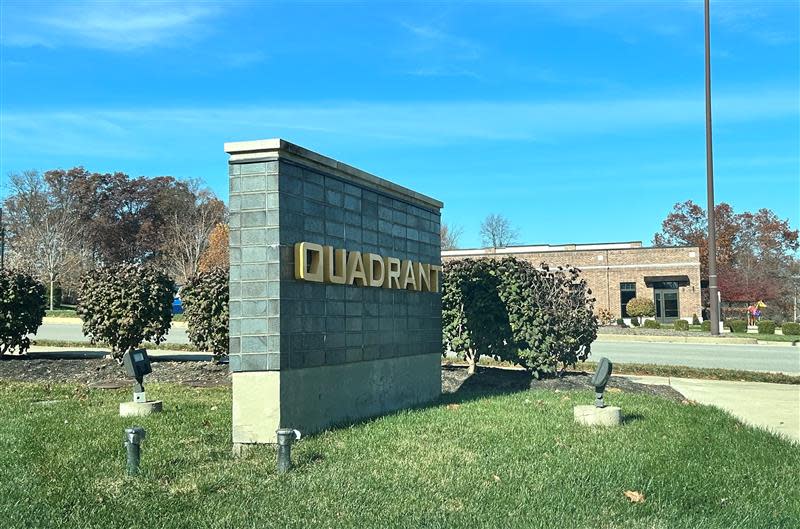Quadrant Magnetics: Where things stand in case alleging company sent military data to China

- Oops!Something went wrong.Please try again later.
It's been just over a year since federal charges were filed against a magnetics company in Louisville and three top executives, alleging they sent confidential U.S. military data to China and defrauded the Department of Defense.
The case is still working its way though the court system, with a trial for the company and three defendants tentatively set for early next year and a nearly $100 million planned company expansion in Louisville on hold.
Lawyers for all parties declined to comment for this story. But here's what a review of documents filed by both sides in U.S. District Court reveals about where the case stands:
The company
Headquartered nationally in San Diego and founded in 1992, Quadrant Magnetics opened its Louisville business hub in 2001 and expanded in Jeffersontown 18 years later.
Charges were in the fall of 2022 against the company along with three of its officials — Phil Pascoe, Monica Pascoe and Scott Tubbs.
Phil Pascoe was the company's president at the time of the arrest, and had previously served as its vice president of operations before his promotion in 2018. Monica Pascoe, his wife, served as accounting manager, while Tubbs was vice president of sales and marketing.
Billing itself on its website as "the worldwide leader in the magnetic industry," Quadrant produces magnetic products used in common devices such as computers and smartphones, along with more complex applications, such as pumping technologies in the oil field and generators and magnetic assemblies used to harness wind energy.
This case focuses on rare earth magnets the company supplies for "aviation systems and other military items" used by the U.S. Department of Defense, according to a grand jury indictment.
At the time of the arrests, Quadrant's investment in Louisville was growing.
Gov. Andy Beshear and then-Louisville Mayor Greg Fischer used its local office to host a press conference in February 2022 touting recent economic growth in the state. A month earlier, Quadrant had announced plans to build a $95 million production facility in the city, its first such complex in the U.S. That project, dubbed "Project Neograss," was expected to create 200 full-time jobs, officials said at the time.
Beshear: “The state of the commonwealth is strong, and one of the major reasons is the state of Louisville.” Several state economic records were broken in 2021 he says, and in January over $660M in new investment and 1,400 jobs were announced. pic.twitter.com/ENx15S3G2n
— Lucas Aulbach (@LucasAulbach) February 11, 2022
But the planned expansion stalled by November 2022 when the U.S. Department of Justice announced the charges.
The case
The indictment's allegations include claims the three defendants repackaged rare earth magnets smelted in China to appear they'd been smelted domestically, and then shipped them to two American companies that used them in parts for the military's F-16 and F-18 fighter jets.
Between early 2012 and late 2018, Quadrant also allegedly exported about 70 drawings that contained classified technical data to a business identified in court documents as Chinese Company 1. Those drawings belonged to the two U.S. companies that supplied parts for military jets and related to “submersible vessels and related articles,” along with "fire control, laser, imaging, and guidance equipment."
Rare earth magnets, which are stronger than typical magnets and are made from rare metals such as neodymium, are required by the Department of Defense to be smelted in the U.S. or another approved country.
The three individual defendants are accused of ordering magnets for the two U.S. companies and then emailing technical data received from those businesses to Chinese Company 1. Quadrant would then allegedly import magnets smelted in China to fulfill orders for those two companies for “aviation systems and other military items.” The magnets were repackaged with Quadrant labeling before being shipped, and Phil Pascoe and Tubbs are accused of instructing employees to conceal the country of origin before shipping.
Monica Tubbs was charged with conspiracy and wire fraud while Quadrant, Phil Pascoe and Tubbs were charged with conspiracy and wire fraud, along with exporting technical data without a license and smuggling goods from the U.S.
The case is still pending in U.S. District Court for the Western District of Kentucky.
The next steps
A jury trial was initially set for early 2023 but has been tentatively pushed back to February.
Quadrant's planned investment in the new Louisville facility came after the Kentucky Business Alliance approved $3.4 million in tax incentives. The project was expected to employ 200 people for Quadrant. Phil Pascoe in 2022 told Business First the company already employed about 60 people in the U.S.
But Brandon Mattingly, spokesperson for the Kentucky Cabinet for Economic Development, told The Courier Journal that agreement never received final approval and "no action has been taken by the company to claim tax incentives from the state."
The cabinet and Quadrant have not had contact since the indictments were unsealed in November 2022, he said. The $95 million project, which the company had hoped to open by mid-2023, has not materialized.
Reach Lucas Aulbach at laulbach@courier-journal.com.
This article originally appeared on Louisville Courier Journal: Quadrant Magnetics: Where company's federal case stands

